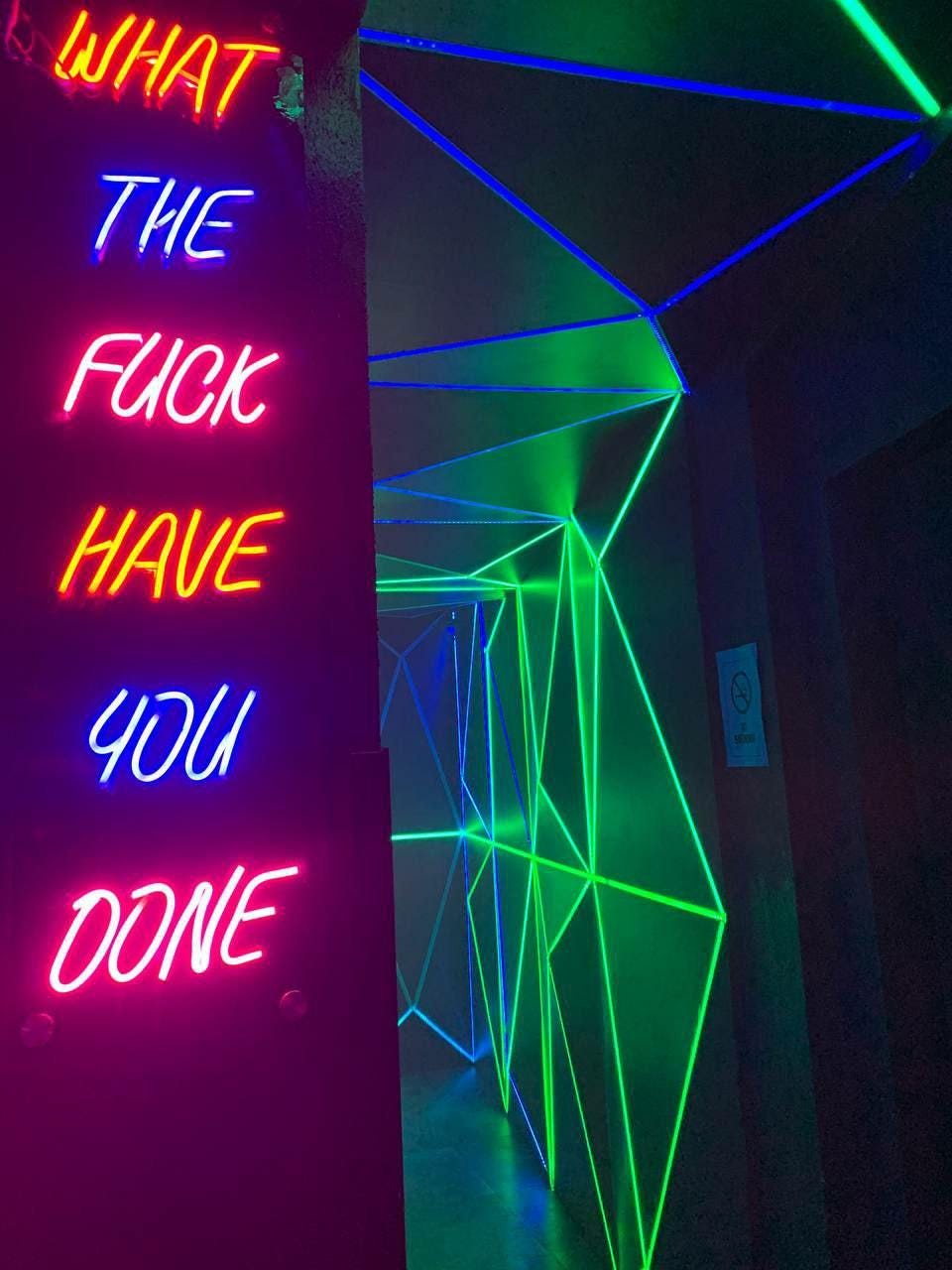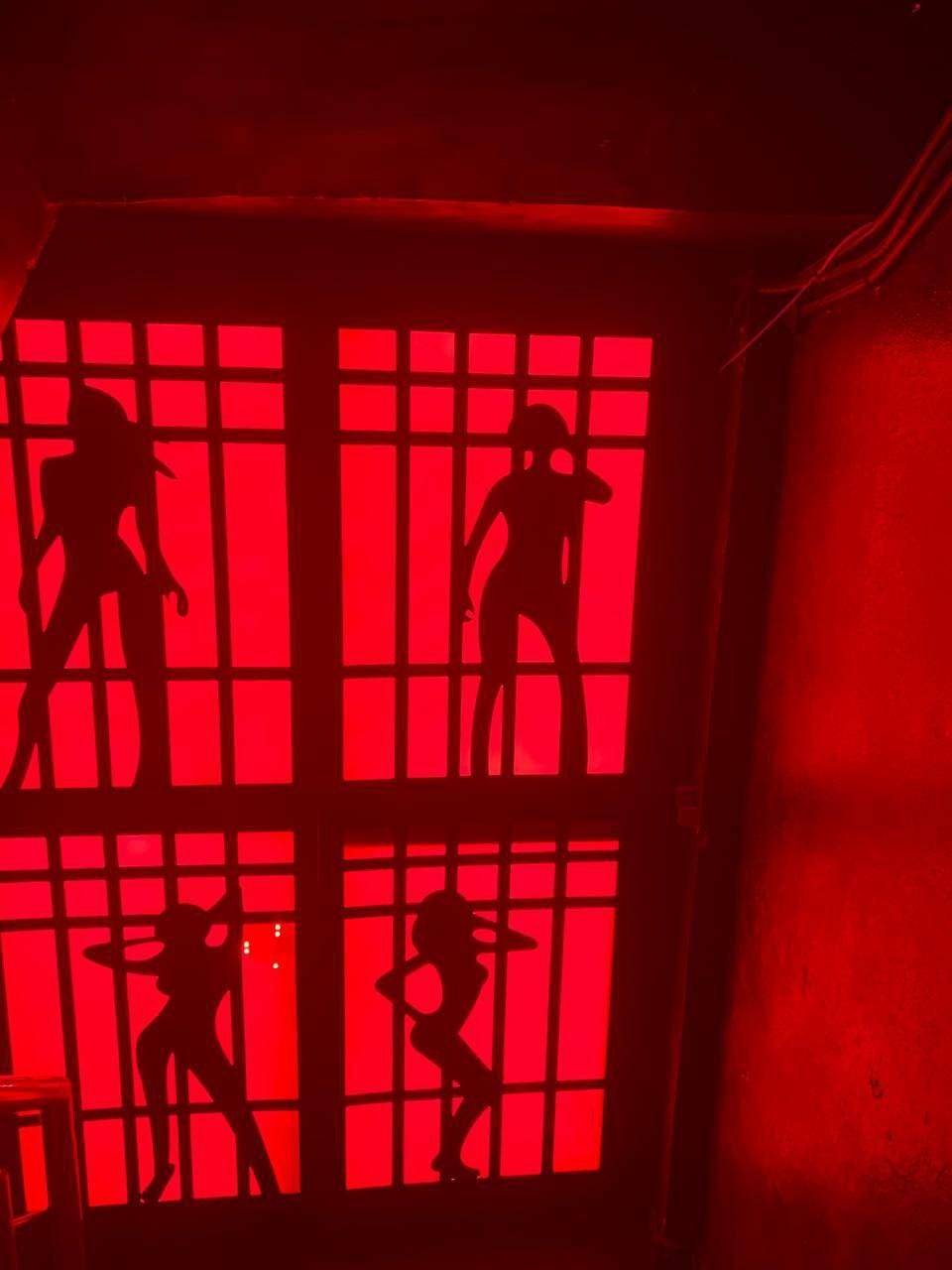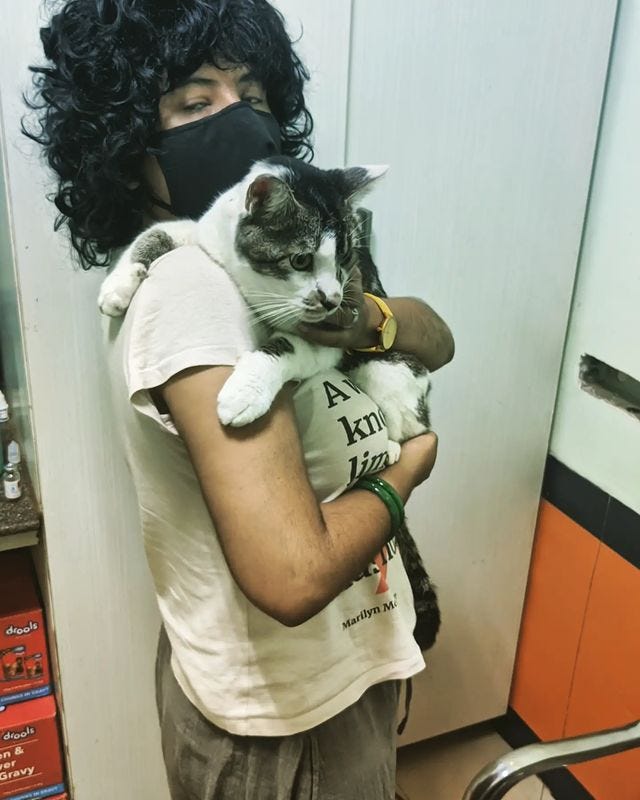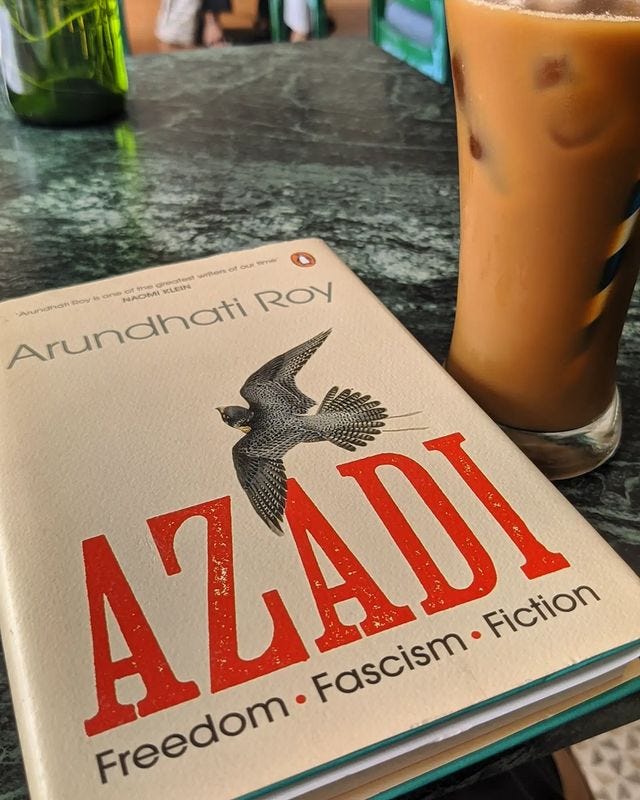
My latest book is The One Who Swam With The Fishes. "A mesmerizing account of the well-known story of Matsyagandha ... and her transformation from fisherman’s daughter to Satyavati, Santanu’s royal consort and the Mother/Progenitor of the Kuru clan." - Hindustan Times "Themes of fate, morality and power overlay a subtle and essential feminism to make this lyrical book a must-read. If this is Madhavan’s first book in the Girls from the Mahabharata series, there is much to look forward to in the months to come." - Open Magazine "A gleeful dollop of Blytonian magic ... Reddy Madhavan is also able to tackle some fairly sensitive subjects such as identity, the love of and karmic ties with parents, adoption, the first sexual encounter, loneliness, and my favourite, feminist rage." - Scroll |
Sign up for my newsletter: The Internet Personified
|
31 October 2021
What I'm Reading

Today in Photo

via Instagram
26 October 2021
Today in Photo

via Instagram
24 October 2021
Today in Photo

via Instagram
20 October 2021
Today in Photo

via Instagram
19 October 2021
The Internet Personified: Village People
My amazing apostrophes,
Long ago, I used to work with this Delhi-based recommendation website where we sent out a daily newsletter of what was hot and new in the city. (And then the Fire Nation attacked—sorry, a little Avatar humour for those of you in the know.) This was around 2012ish? I had moved back to Delhi recently from Bombay, I was working on Cold Feet, living in Nizamuddin, dating K, life was good for both me and Delhi, where it seemed like the city had never before been so vibrant, so alive.
A lot of this vibrant aliveness seemed to be originating from Hauz Khas Village. You probably either know of Hauz Khas Village or are intimately acquainted with it, in which case, you probably call it HKV. Us Delhiites—Delhicacies, I used to call us—love to abbreviate things into acronyms. “CP,” we’ll say lovingly, about Connaught Place, “Bhaiyya” to the auto driver, “Take me to CP.” My college—Lady Sri Ram College for Women—was LSR to those who walked down its hallowed halls, and those that only wished they could. Nearby Defence Colony was Def Col, up in North Campus the students shortened Kamla Nagar to K Nags. When we don’t abbreviate, we let the words run together: Malviyanagar and Krolbagh (Malviya (SPACE) Nagar, that is, Karol Bagh, that is.) Kids, in 2012, there were two kinds of people who frequented Hauz Khas Village, the ones who dropped the “village,” making it just “Hauz Khas” (inaccurate because there’s a whole swathe of area including across the road that is all Hauz Khas) and ones who called it HKV. I teetered, like the indecisive person I am, and yet, I visited every week, because every week there was a new restaurant, a new store.
In 2009, when I used to visit Delhi from Bombay, all my friends wanted to go to one place. It was new, it was trendy, it was in Hauz Khas Village—wait, can I just call it HKV for the rest of this newsletter? See, I use my capslock key whenever I type capital letters (I taught myself to type and shift+letter never came organically) and so it’s a pain to do caps on, caps off three times. HKV, ok?—anyway, in 2009, when we wanted to go to a cool new place to drink and dance and chat, there was only one destination everyone was dying to take me to, and that was TLR in HKV. TLR stood for The Living Room, it wasn’t much in terms of food or drink, but up until then HKV had been a sleepy little urban village, Delhi is full of them, where you’d go to buy wedding clothes or take your relatives from out of town on a shopping expedition to.
We have one of Delhi’s several ancient urban villages bordering our much-newer colony. They all have a distinctive character of their own, and some things they all hold in common: roads are narrow and dark, newly constructed buildings now teeter head and shoulders over the rest so the residents can get some light, and there’s everything you want: from groceries to opticians to pharmacies, right on your front door. Because many of the residents are now richer than they were, invariable turf wars break out about parking—the streets have not yet caught up with what the residents want. But, ultimately, they are more village than city, all the doors are open and people wander in and out and talk to each other in courtyards and drink tea together at the chai stall as they watch cars honk their way through the narrow roads (a great shortcut between two neighbourhoods) where once there were only cows. Imagine this: claustrophic warrens of roads and now imagine adding ten or fifteen or thirty of Delhi’s trendiest restaurants in the middle of all this, and imagine the electric wires, always a little touch and go, snarling into large rat king nests above your head and buildings which were only meant to hold one family now seeing patrons streaming up and down the stairs, and imagine all the families who used to live there leaving because it was just more money to let out their houses instead of staying in them. It was still called a village, but there were no residents any more.
Experts—and by “experts” I mean anyone not dazzled by the European feel of the whole thing, the street partyness of all of it—began to talk gloomily about how bad a fire would be in 2012, the height of its trendiness, but in 2009, there was only TLR, which the owners had cleverly done up like a living room, so cozy mismatched armchairs sat around scuffed coffee tables, the bartender was a woman (rare) and a friend of yours (even rarer). A little while after TLR there was Gunpowder, trendy Malayali food in a city that had, up until then, only seen North Indian food at stuffy restaurants that had a live sitar player and offered you saunf as a mouth freshener. Gunpowder was edgy, a small restaurant up several floors, I forget whether they had beer or if you could bring your own? It was cool, was what it was. It was traditional Malayali food but it was cool. (The owner of that as well as the owner of TLR have since relocated to Goa where they continue to do cool things.)
By the time I returned to Delhi from Bombay at the end of 2010 (wow, I’ve been here eleven years on this go-round, better leave before I wind up a Lifer) it was acknowledged that HKV was where it was at. By the time 2012 and my new job came round, it was the only place in Delhi to meet. I’m not even being hyperbolic here—there was literally nowhere else you’d meet your friends.
In many ways this was a class thing. The Delhi metro, introduced just a few short years ago, had made wide swathes of the city suddenly accessible to everyone. And if you’re posh or posh-adjacent, you don’t want to hang out with everyone. You want to be in a bubble of just your own kind of people. Bombay is much more eclectic than this, it’s a grittier city, more of an elbows-out philosophy, so if you can get in somewhere, everyone else assumes you deserve it. Delhi, now, has been build on a foundation of snobbery, of political royalty and diplomats and editors meeting sources for coffee, and so it’s a city of clubs: Gymkhana, Golf, IIC, Press, Foreign Correspondent’s, etc etc. If everyone can get in and the Delhiite doesn’t even get to “use their contacts” then it’s not worth it. Everything about this city must be built on contacts—the more you have, the more powerful you are. It’s that kind of flex. You must also have a “really good” service person for everything and bonus if you can recommend this person to other people. “My electrician is brilliant,” one person will say, and “Have you tried my bootlegger?” We must have bootleggers and cigar guys and all that sort of thing (if you get my drift) because this is a city of house parties, thanks to all that aforementioned snobbery. I used to date exclusively through house parties (I’m very old, K and I found each other pre-dating apps) because all the men were sort of pre-vetted, so they [the parties] were an important part of my social structure. People don’t have that many house parties any more because as we age our ideas of what is acceptable host behaviour has changed from “leave a bag of chips out” to “let’s have this shindig catered” and that just winds up being too much work for you to host more than twice a year. [That being said, we had a wonderful party at our house last weekend and it was a mix of old school—BYOB—and adulthood (catered food).]
So HKV was kind of like a large house party at its peak. You could expect mostly everyone there to be like you, so it felt safe for Delhi, and this showed in the fashion: shorts and tank tops and bustiers and low cut dresses and men in bow ties and fedoras. Parking was a mess, on Saturday evening you could expect to spend 40 minutes in your car just waiting in bumper to bumper traffic for an open spot, but it was incredible once you got in.
By 2012, every week there’d be a new restaurant or cool hipster shop open at HKV. As someone who wrote about the city, I began to feel slightly perturbed that all our week’s listings were being swallowed up by this one bit of real estate, so I proposed we start Village Wednesdays, which is exactly what it sounds like. Wednesday morning you could expect to have everything HKV related in your inbox. This is how I found a shoe store with a Pixies lyric painted on their back wall, a really nice egg salad sandwich on a little balcony that lasted exactly one month, and… you know, I can’t remember. How ephemeral those restaurants, those businesses. They folded quickly, new ones popped into their place, none leaving more than a five minute impression.
2021
HKV is, like everything else, cleaned out by COVID. (A Delhiite’s COVID flex by the way was having a “testing guy” who’d come to your house within 24 hours even on the busiest days, your own GP on WhatsApp, and later, darker, “an oxygen guy.”) K wanted to do a pub crawl, we asked our friends Mansha and Nikhit to join us. They looked at us slightly askance “no one goes to HKV any more” and I shrugged, I didn’t want to go either, HKV had gotten, I said to Mansha “damn shady.” But K wanted to go, and one of his talents is persuading people to see that his plan is just more fun than everyone else’s. I don’t know how he does it, it’s a rare skill, but it almost always works (unless I’m very sleepy) and it’s usually a good time. So with many “He’ll see” looks exchanged between me and Mansha, both native to this city, we went off, into the parking lot that looked like a true crime story waiting to happen with all the street lights not working and drunk men in small cars like evil clowns.
But you know, it was a fun time, despite it all. First we climbed a zillion floors to get to a rooftop bar, where a man sang Hindi songs from the 90s with a guitar, and the whole place was full, and then another man persuaded us to climb another flight of stairs to check out his “very decent” bar. There are barkers on the road now in HKV, where there used to be crowds of bored glamorous people, there are eager and sweaty young men calling, “come to my bar, ladies night” and another going “come to my bar, live music” and the one we chose kept saying “it’s decent, it’s decent” and as we ascended the stairs, faced with a light fixture that had silhouettes of naked women against red light, he said, “where are my decent guests?” led us past the Punjabi disco vibe on the first floor to a terrace garden, which was so decent, we were insulted, especially when a baby began to wail at the table next to us.
The hostess and the barker kept trying to dissuade us from going downstairs where the music roared, but finally they shrugged. If we—their Decent Guests—were going to ignore their advice, what could they do? We went downstairs, it was loud, gritty and possibly had a line of sex workers at the back, Mansha said, though I missed them. I think this bar was where I once ate cream of asparagus soup, across from a date, on a bare wood table under fairy lights. I think it might’ve been where we met a bunch of friends once, I think we used to haunt this particular staircase, though it could’ve been the one next door, who can tell any more, the years and bars blur into one.
Later still we went to Summer House, that last bastion of People Like Us, and sure enough, all the People Like Us were there, it was absolutely heaving, but the crowd was comforted knowing that everyone there was the same.
OKAY! My essays are getting longer as the days—and my time in Delhi—are getting shorter. Please buy me a coffee if you liked this and/or my other letters to you! It means a lot. Thank you to everyone who has, you make my heart sing!
Links I Loved On The Internet!
I wrote about my new favourite Facebook group Free Your Stuff Berlin for Dirt (which you should all subscribe to.)
LOL links:
This series on the best restaurant in New York.
A little old now we know the winner, but still this piece on who will win the Nobel Prize in Literature made me laugh.
Longreads:
Greatly enjoyed this piece on why the name “Sanjana” became popular in India.
Why Tehran was like Hogwarts for this writer. Beautiful essay.
I hate my dogs, I love my dogs sums up how I feel about my cattos also.
Have a great week! Go do something fun—but only if you’re vaccinated.
xx
m
Where am I? The Internet Personified! A mostly weekly collection of things I did/thought/read/saw that week.
Who are you? Meenakshi Reddy Madhavan, writer of internet words (and other things) author of seven books (support me by buying a book!) and general city-potter-er.
Follow me on Twitter, Facebook and Instagram. (Plus my book recommendation Instagram!)
Got sent this newsletter? Sign up here to subscribe!
Forward to your friends if you liked this and to the Ghost of Gentrification Past if you didn’t.
Also, write back to me! I love to hear from you.
18 October 2021
What I'm Reading

17 October 2021
Today in Photo

via Instagram
16 October 2021
Today in Photo

via Instagram
10 October 2021
Today in Photo

via Instagram
7 October 2021
Today in Photo

via Instagram
6 October 2021
The Internet Personified: A funny thing happened on the way to learn German
My dear cocktail sausages,
I told you na, I’d been taking language classes while I was in Berlin? For those of you who have just joined me: I signed up for an intensive one month course in Berlin while I was there. I would’ve continued in my own slow way: Duolingo and Language Transfer and a small paid-for course on Udemy, and watching Netflix shows in German with English subs and vice versa, and all these things are great, and helped me a lot, but nothing beat actually going to a class and speaking my first fumbling sentences out loud in a room that was also full of beginners. I also thrived, I realised, on the competition. It’s terrible, and I did also say pious things to people like, “Don’t worry, we’re all here to learn!” but secretly, I was thinking, “Except me, I’m here to crush it.” The class helped me get more confident, the competition aspect helped motivate me to do my homework and also use my little baby German wherever I went. I got pretty good pretty fast (K’s completely unbiased opinion) and this was also good because in order to apply for a spouse visa (what the Germans call a “family reunification” visa) I need to show them that I can speak at an A1 level. Which means passing an exam. It’s not very nice of the Germans, I can’t think of many other countries that make you pass a language exam, it seems unnecessarily exclusionary, but what are you going to do, right? You can’t tell them that like all reasonable people you expect you will pick up some German while you’re living there (this rule only applies to people under 15, the idea being that the older you are, the harder it is to learn), so you must demonstrate in three parts: hearing, writing and oral, that your German is good enough to be allowed in.
COVID fall-out touched the Goethe exams as well, half the centres across the city are closed so people flew in from all around the country to sit the exam in Delhi. In my room, the smallest of all of them, there was a woman from Gujarat and another woman from Afghanistan. It was mostly women, I did a quick check when I went outside to wait for the oral exam, only two men behind me, only two walking out of the room where the oral exam was in the whole time I sat there. My teacher at German school had said something different, she said A1 and A2 were usually the only two levels you saw men at, after that, when we climb into the Bs and Cs, she said, they mostly disappear. I had noticed they (the men) were less forthcoming also, except for a Colombian doctor who worked in Sweden and was in Berlin for a quick holiday so decided to learn German really fast. He talked in class but he didn’t socialise with us during our coffee break, and he missed the last week of lessons altogether. The Palestinian man didn’t socialise at all, walking off with his coffee and his phone, but he brought in chocolate for his birthday and he was the only one of the four men who joined our little class for a farewell meal before we all dispersed.
The week had already been stressful for me. Bruno, our brindle tabby, had lost a noticeable amount of weight when I returned. K came back a little after I did, and I thought maybe Bruno missed us and was off his food, so we pampered him and fed him wet food and chicken and all sorts of delicious things and kept the cat flap closed so he couldn’t go outside, but one week later, we had to admit that it wasn’t working, so we took him to the vet. Turned out he had a kidney infection, so we’ve been going back and forth to the vet every day for the last ten days. His second blood test came back showing signs of improvement though, so we are just to give him drips twice a day and then test him again. Of course we love him and we are happy to do it, but it has put a bit of a spanner in the plans we made so gloriously before we came back to Delhi.
Every morning therefore we went to the vet, and sat in a waiting room filled with people worried about their pets, the same language. People bringing their sick pets in don’t have much to say to anyone else, you can tell the ones who have come for minor things by how they bounce in, delightedly leading a fat labrador (why are all the labradors so grotesquely obese?) or holding a little Yorkie, or controlling a pit bull puppy who is waddling his front feet in the air despite his cone of shame. Those of us with sick pets just sit, cage on laps, or dog bundled in a towel or old dog by our feet. We don’t make eye contact, we barely look at our phones. We murmur to our pets, stroking them gently to keep them calm. It’s a kindred feeling, all of us separate but together. You tell me how your dog hates to be given a drip, I tell you how my cat’s kidneys might be failing. We understand in a way the healthy animal owners do not.
The other morning, walking in, I saw the whole waiting room tense and turn towards one exam room. The big glass window was a picture view. I thought it was just a golden retriever being given a drip, I didn’t understand why there was this palpable air of tense waiting. A young woman had her hands clasped over her mask, it took me a little while to see her as the owner, the same instant that I realised that our vet wasn’t giving the golden a drip after all, his hands were thudding on the dog’s chest, the heels of his palms pressing then stopping. He was giving the dog CPR. The force of his hands made the dog move but was he breathing on his own? We stood behind the girl in silent vigil until I finally thought to sit down. By then she had doubled over on herself and was weeping loud sobs that sounded like they were wrenched out of her. I saw her try to go in and her male companion who was inside with the dog stop her in a you don’t want to see this gesture. We all said nothing, the woman on our other side was also weeping, even though she wasn’t connected to this girl at all. I felt hot tears in my eyes and a lump in my throat and frightened, I tried to disassociate, to imagine myself writing it down instead. Her sobs turned into a howl, the dog was dead. Next to her was another dog, the dead one’s companion, he made an eager barking noise and tried to go in to his friend. We were shown into our exam room and I could hear her crying through the walls.
There’s the time that even a shared language fails you. My sick but alive pet, her dead one. No way to cross the breach of just a few steps and touch her on the shoulder and tell her it’s going to be okay.
I found myself immersed in German as I learnt it. Suddenly, things had meaning. I’d never taken a language course before in the country of that language. My first lessons: who am I, how old am I, where do I come from, someone asked me all those questions in real life not one week later. It was such an astounding feeling: these words I am learning to say, they mean something to other people!
I did a sample lesson of French and one of Spanish back in the day. Our teachers were Indian, our class was Indian, we spoke English again as soon as we exited. Forgive me for not thinking of those as “real” languages, only something that existed in a classroom. Oh sure I knew there were countries where they were spoken, but they may as well have been on the moon.
“It’s so funny to think of you speaking a different language,” said a friend to me, and I knew what she meant. I watched my Bombay friend and my Delhi friend, both in Berlin now, speak basic German to people, I watched a new acquaintance actually banter in German with her German friends, and I thought, “Wow, look at them speaking a foreign language.”
My German is slow, painstaking. I feel my face contort, my eyes get smaller. Words don’t come to my head automatically, I have to recall each one from the soft spot in my brain they have lodged themselves in, like yanking out teeth. “I… am…going..,” I say, “to… the… shop…buying…chicken.” Some Germans watch my mouth anxiously as I talk, eager to catch every word as it emerges. Others wait patiently, and respond so quickly I have no time to make up my next sentence. Everyone is nice to me as I learn, and I also learn body language as I go along, how someone will be impatient because it is a busy day, who to approach if I am lost or need a lighter for my cigarette, who to catch eyes with and smile. Two languages, side by side.
English is not a language I think much about as I’m using it. I mean, English is like my skin, I inhabit it fully, bumps and warts and cuts and all. I never have to think about English, if I wanted to just let my tongue go loose and babble, I could without so much as a slight flex of my brain. Writing things down is different, of course. When I write, I am deliberate. I have to be because to convey the very vaguest of thoughts in my head, like this one, for example: explain English, I must construct a precise sentence using words that will take the thought straight from my head into yours. I’m making you see what I’m thinking, in other words. This requires knowing and loving a language.
After my exam, I had some time to kill and so I went to the Full Circle bookstore in Khan Market and bought myself a copy of Arundhati Roy’s Azadi and then went upstairs to the cafe to read it, and lo and behold, the very first essay was about language. (Here it is to read online.) In it, Ms Roy is talking about what languages belong to us, and whether as Indians, we can ever claim to own English. It’s a conversation that happens again and again, especially around Indian writers, there’s a whole divide between the writers who write in vernacular languages and those of us that do in English. We feel, I think, slightly guilty for our English skills, in India it’s very much associated with being elite, being posh, and so our writing must also be posh, is the argument. They feel—as far as I’ve read—resentful that Indian writing in English always gets more attention than Indian writing in any other language.
But as the years go by, I realise English belongs to me as much as it did to Shakespeare or Mark Twain or Jane Austen or, or, anyone. It began as a coloniser language, but we all learnt it, all over the globe, it’s how we communicate with each other in the absence of other tongues.
Our new landlady in Berlin asked me, “So do you write in your own language?” and for the life of me, I cannot recall if I said, “Yes, I write in English” or “No, I write in English.”
My German is halting, but my Hindi is only instructive. In North India, where I have grown up speaking Hindi all my life since I was barely three, this is a function of my privilege. I haven’t practised Hindi except to ask for things. I get only so far in conveying my thoughts, the more complicated they become, the more tongue tied I get. Once, in school, they asked us to write a short essay on “kissa kursi ka” which I translated to mean “the story of a chair” which it is, very literally, but which also refers to, in this case, the story of a political chair. I was meant to write about elections, I wrote the life story of a chair, from wood to death.
After the reading and writing portions of our exam, we all sat around in that small room, waiting for them to begin the oral section, and so we all got talking, except for this one woman who sat quietly by herself. “Where are you from?” asked one of the others, and she said, “Afghanistan.”
(Which led to a whole lot of extremely frustrating loud tactless remarks from two of the women there where this poor woman was asked in varying order: a) how Istanbul was these days, b) how come the Taliban let her fly, c) the difference between a hijab and a burkha, and d) not a question, just an observation that all the refugees left in Afghanistan and elsewhere were uneducated because the educated ones left ages ago.) (At that last one, I, who had been trying to rehearse my German in my head, also had to say something because otherwise it was only the third Indian in the room, who was trying to fight a losing battle with the other two over some of their remarks.)
Anyway the Third Woman suggested to the rest of us that we switch to Hindi, it being closer to Urdu, which was closer to… Pashtun? I don’t know the logic, but as soon as she said it, I felt every single word of Hindi I’d ever learnt wing its way out of my head and through the open window. I could remember German, I could remember English, but for the life of me I could not form one single Hindi sentence. It was like I was paralysed, able to hear and understand everything around me, but unable to speak. So when I did speak to the Afghani woman later—we were partners for our oral exam—it was in a mix of English and broken German.
Maybe it was a way of aligning myself away from Indian women just like me, with similar accents and similar sensibilites and their way of not thinking about a world that existed beyond them. Maybe I didn’t want to speak Hindi any more in that room if that was where Hindi was going to take me. Maybe it was just a track change, if I am translating English to German in my head, I can’t simultaneously translate English to Hindi. Maybe every time you pick up a new language you have to lose others for a while, just until you learn.
Phew. What a very long letter to inflict upon you all! If you liked my ramblings, consider buying me a coffee? If you’d rather short and pithy updates, consider buying me a coffee also! Win-win for all of us.
Oh boy do I have a lot of links for you this week:
Guys please read this delicious drama that NYT somehow decided was worth a whole novella.
Love this Substack about how to figure out where people are by their photos (& therefore protect yourself more.)
On bestiality and whether animals can consent.
I just love gossip about new media.
Picky puppy food journal.
I also really love negative restaurant reviews when they’re done so cleverly.
Have a great week!
xx
m
Where am I? The Internet Personified! A mostly weekly collection of things I did/thought/read/saw that week.
Who are you? Meenakshi Reddy Madhavan, writer of internet words (and other things) author of seven books (support me by buying a book!) and general city-potter-er.
Follow me on Twitter, Facebook and Instagram. (Plus my book recommendation Instagram!)
Got sent this newsletter? Sign up here to subscribe!
Forward to your friends if you liked this and to people who really should think before they speak if you didn’t.
Also, write back to me! I love to hear from you.
5 October 2021
Today in Photo

via Instagram
3 October 2021
Today in Photo

via Instagram
2 October 2021
Today in Photo

via Instagram
1 October 2021
What I'm Reading










